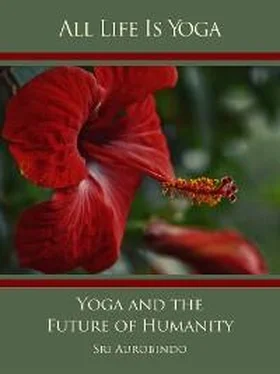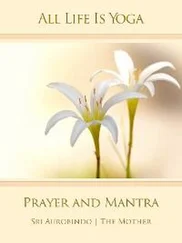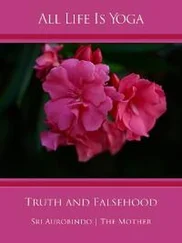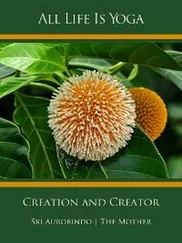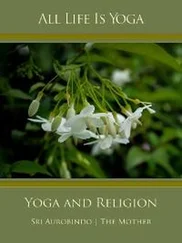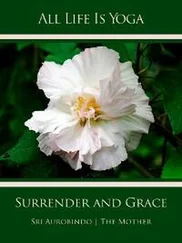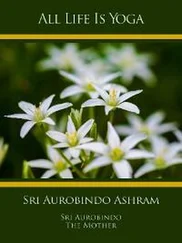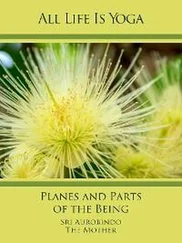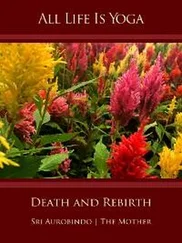Sri Aurobindo - All Life Is Yoga - Yoga and the Future of Humanity
Здесь есть возможность читать онлайн «Sri Aurobindo - All Life Is Yoga - Yoga and the Future of Humanity» — ознакомительный отрывок электронной книги совершенно бесплатно, а после прочтения отрывка купить полную версию. В некоторых случаях можно слушать аудио, скачать через торрент в формате fb2 и присутствует краткое содержание. Жанр: unrecognised, на английском языке. Описание произведения, (предисловие) а так же отзывы посетителей доступны на портале библиотеки ЛибКат.
- Название:All Life Is Yoga: Yoga and the Future of Humanity
- Автор:
- Жанр:
- Год:неизвестен
- ISBN:нет данных
- Рейтинг книги:3 / 5. Голосов: 1
-
Избранное:Добавить в избранное
- Отзывы:
-
Ваша оценка:
- 60
- 1
- 2
- 3
- 4
- 5
All Life Is Yoga: Yoga and the Future of Humanity: краткое содержание, описание и аннотация
Предлагаем к чтению аннотацию, описание, краткое содержание или предисловие (зависит от того, что написал сам автор книги «All Life Is Yoga: Yoga and the Future of Humanity»). Если вы не нашли необходимую информацию о книге — напишите в комментариях, мы постараемся отыскать её.
All Life Is Yoga: Yoga and the Future of Humanity — читать онлайн ознакомительный отрывок
Ниже представлен текст книги, разбитый по страницам. Система сохранения места последней прочитанной страницы, позволяет с удобством читать онлайн бесплатно книгу «All Life Is Yoga: Yoga and the Future of Humanity», без необходимости каждый раз заново искать на чём Вы остановились. Поставьте закладку, и сможете в любой момент перейти на страницу, на которой закончили чтение.
Интервал:
Закладка:
1. The Psychology of Yoga Chapter 1 The Psychology of Yoga Yoga is not a modern invention of the human mind, but our ancient and prehistoric possession. The Veda is our oldest extant human document and the Veda, from one point of view, is a great compilation of practical hints about Yoga. All religion is a flower of which Yoga is the root; all philosophy, poetry and the works of genius use it, consciously or unconsciously, as an instrument. We believe that God created the world by Yoga and by Yoga He will draw it into Himself again. Yogah prabhavapyayau, Yoga is the birth and passing away of things. When Srikrishna reveals to Arjuna the greatness of His creation and the manner in which He has built it out of His being by a reconciliation of logical opposites, he says “Pasya me yogam aishwaram”, Behold my divine Yoga. We usually attach a more limited sense to the word; when we use or hear it, we think of the details of Patanjali’s system, of rhythmic breathing, of peculiar ways of sitting, of concentration of mind, of the trance of the adept. But these are merely details of particular systems. The systems are not the thing itself, any more than the water of an irrigation canal is the river Ganges. Yoga may be done without the least thought for the breathing, in any posture or no posture, without any insistence on concentration, in the full waking condition, while walking, working, eating, drinking, talking with others, in any occupation, in sleep, in dream, in states of unconsciousness, semi-consciousness, double-consciousness. It is no nostrum or system or fixed practice, but an eternal fact of process based on the very nature of the Universe. Nevertheless in practice the name may be limited to certain applications of this general process for specific and definite ends. Yoga stands essentially on the fact that in this world we are everywhere one, yet divided; one yet divided in our being, one with yet divided from our fellow creatures of all kinds, one with yet divided from the infinite existence which we call God, Nature or Brahman. Yoga, generally, is the power which the soul in one body has of entering into effective relation with other souls, with parts of itself which are behind the waking consciousness, with forces of Nature and objects in Nature, with the Supreme Intelligence, Power and Bliss which governs the world either for the sake of that union in itself or for the purpose of increasing or modifying our manifest being, knowledge, faculty, force or delight. Any system which organises our inner being and our outer frame for these ends may be called a system of Yoga. * * *2. The Object of Our Yoga 3. The Evolutionary Aim in Yoga 4. The Fullness of Yoga – In Condition 5. The Conditions for Integral Fulfilment 6. Sachchidananda 7. Beyond Good and Evil 8. The Principle of Evil 9. Man – Slave or Free? 10. Yoga and Human Evolution 11. Aphorisms II. ALL LIFE IS YOGA Quotation 1. Life and Yoga 2. The Three Steps of Nature 3. The Threefold Life 4. The Systems of Yoga 5. The Synthesis of the Systems III. THE INTEGRAL TRANSFORMATION Quotations 1. Supermind and the Life Divine 2. Supermind and Humanity 3. Supermind in the Evolution APPENDIX ReferencesGuide Cover Table of Contents Start Reading
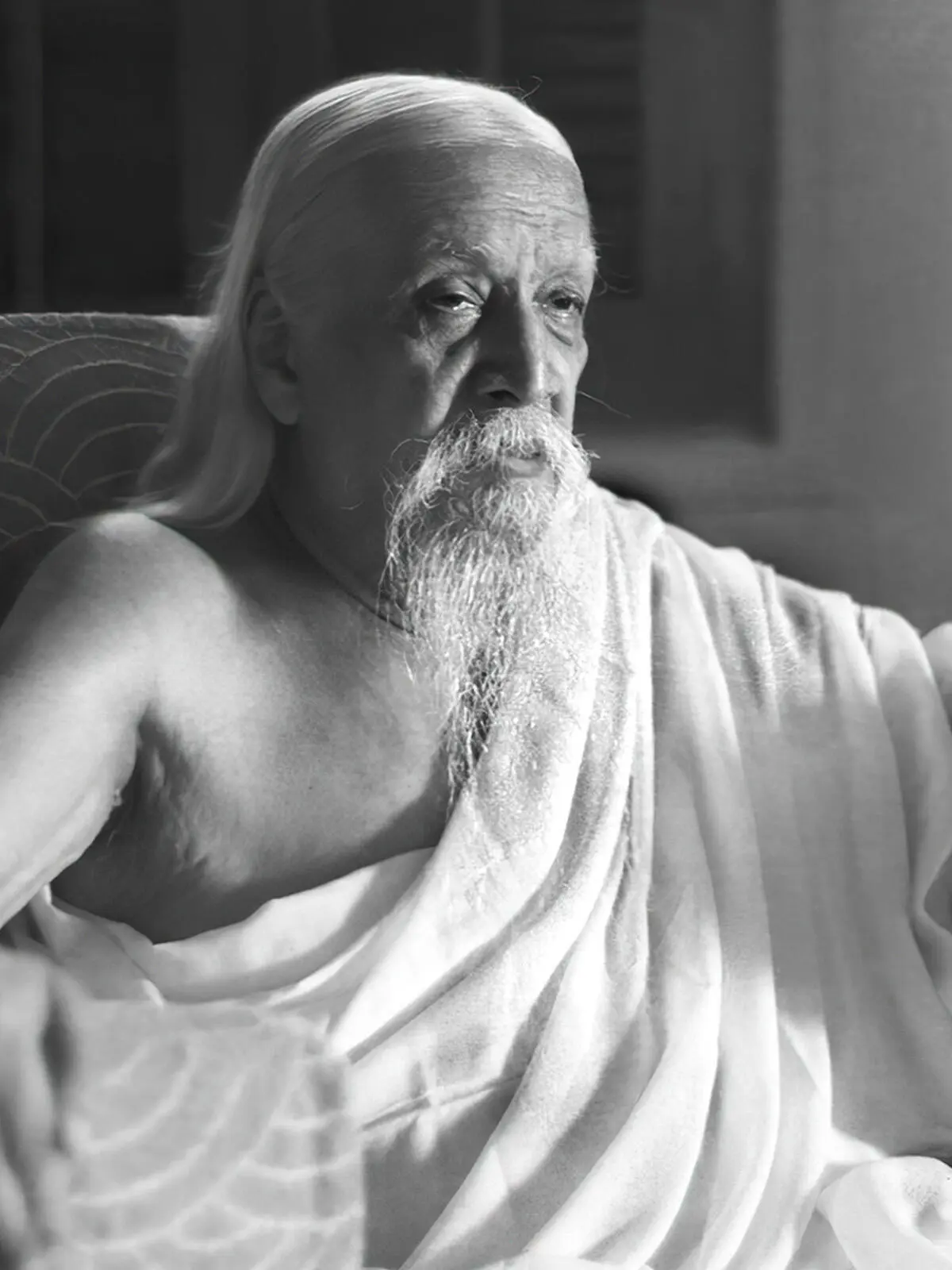
Sri Aurobindo
Yoga must be revealed to mankind because without it mankind cannot take the next step in the human evolution. — Sri Aurobindo
* * *
Chapter 1
The Psychology of Yoga
Yoga is not a modern invention of the human mind, but our ancient and prehistoric possession. The Veda is our oldest extant human document and the Veda, from one point of view, is a great compilation of practical hints about Yoga. All religion is a flower of which Yoga is the root; all philosophy, poetry and the works of genius use it, consciously or unconsciously, as an instrument. We believe that God created the world by Yoga and by Yoga He will draw it into Himself again. Yogah prabhavapyayau, Yoga is the birth and passing away of things. When Srikrishna reveals to Arjuna the greatness of His creation and the manner in which He has built it out of His being by a reconciliation of logical opposites, he says “Pasya me yogam aishwaram”, Behold my divine Yoga. We usually attach a more limited sense to the word; when we use or hear it, we think of the details of Patanjali’s system, of rhythmic breathing, of peculiar ways of sitting, of concentration of mind, of the trance of the adept. But these are merely details of particular systems. The systems are not the thing itself, any more than the water of an irrigation canal is the river Ganges. Yoga may be done without the least thought for the breathing, in any posture or no posture, without any insistence on concentration, in the full waking condition, while walking, working, eating, drinking, talking with others, in any occupation, in sleep, in dream, in states of unconsciousness, semi-consciousness, double-consciousness. It is no nostrum or system or fixed practice, but an eternal fact of process based on the very nature of the Universe.
Nevertheless in practice the name may be limited to certain applications of this general process for specific and definite ends. Yoga stands essentially on the fact that in this world we are everywhere one, yet divided; one yet divided in our being, one with yet divided from our fellow creatures of all kinds, one with yet divided from the infinite existence which we call God, Nature or Brahman. Yoga, generally, is the power which the soul in one body has of entering into effective relation with other souls, with parts of itself which are behind the waking consciousness, with forces of Nature and objects in Nature, with the Supreme Intelligence, Power and Bliss which governs the world either for the sake of that union in itself or for the purpose of increasing or modifying our manifest being, knowledge, faculty, force or delight. Any system which organises our inner being and our outer frame for these ends may be called a system of Yoga.
* * *
Chapter 2
The Object of Our Yoga
The object of our Yoga is self-perfection, not self-annulment. There are two paths set for the feet of the Yogin, withdrawal from the universe and perfection in the Universe; the first comes by asceticism, the second is effected by tapasya; the first receives us when we lose God in Existence, the second is attained when we fulfil existence in God. Let ours be the path of perfection, not of abandonment; let our aim be victory in the battle, not the escape from all conflict.
Buddha and Shankara supposed the world to be radically false and miserable; therefore escape from the world was to them the only wisdom. But this world is Brahman, the world is God, the world is Satyam, the world is Ananda; it is our misreading of the world through mental egoism that is a falsehood and our wrong relation with God in the world that is a misery. There is no other falsity and no other cause of sorrow.
God created the world in Himself through Maya; but the Vedic meaning of Maya is not illusion, it is wisdom, knowledge, capacity, wide extension in consciousness. Prajna prasrita purani. Omnipotent Wisdom created the world, it is not the organised blunder of some Infinite Dreamer; omniscient Power manifests or conceals it in Itself or Its own delight, it is not a bondage imposed by His own ignorance on the free and absolute Brahman.
If the world were Brahman’s self-imposed nightmare, to awake from it would be the natural and only goal of our supreme endeavour; or if life in the world were irrevocably bound to misery, a means of escape from this bondage would be the sole secret worth discovering. But perfect truth in world-existence is possible, for God here sees all things with the eye of truth; and perfect bliss in the world is possible, for God enjoys all things with the sense of unalloyed freedom. We also can enjoy this truth and bliss, called by the Veda amritam, Immortality, if by casting away our egoistic existence into perfect unity with His being we consent to receive the divine perception and the divine freedom.
Читать дальшеИнтервал:
Закладка:
Похожие книги на «All Life Is Yoga: Yoga and the Future of Humanity»
Представляем Вашему вниманию похожие книги на «All Life Is Yoga: Yoga and the Future of Humanity» списком для выбора. Мы отобрали схожую по названию и смыслу литературу в надежде предоставить читателям больше вариантов отыскать новые, интересные, ещё непрочитанные произведения.
Обсуждение, отзывы о книге «All Life Is Yoga: Yoga and the Future of Humanity» и просто собственные мнения читателей. Оставьте ваши комментарии, напишите, что Вы думаете о произведении, его смысле или главных героях. Укажите что конкретно понравилось, а что нет, и почему Вы так считаете.
